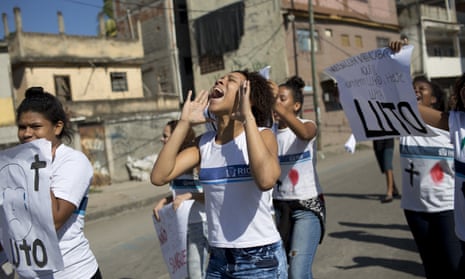Brazilians have reacted with outrage and revulsion after the death of a 14-year-old schoolboy, who was shot during a security operation during which a police helicopter strafed a densely-populated Rio de Janeiro favela.
After Marcos Vinicius da Silva died in a hospital on Wednesday night, residents of the Maré favela blocked the highway that leads to Rio’s international airport and a bus was set on fire. Police said that six gang members were killed in the operation.
The deadly security operation came a day after intense gun battles rattled other favelas near the centre of Rio and two weeks after the cable car to the city’s landmark Sugar Loaf mountain was closed during a battle between police and gang members vying for control of two favelas near Copacabana Beach.Witnesses said that the police helicopter had fired indiscriminately into a densely populated area near a school – an accusation supported by cellphone footage. Teams from the Redes da Maré non-profit group counted over 100 bullet holes in the ground.
In an emotional video published on the O Globo website, the boy’s mother, Bruna da Silva, displayed his bloodstained school uniform T-shirt and rucksack.
His father, José da Silva, 37, told the newspaper his son had been late for school but decided to go home when he first heard gunfire. He was almost home when he was shot in the stomach.
“Why do they see a school uniform and fire? Because they are not police. They are murderers,” he said.
A "força de segurança" utiliza a ação de helicópteros com disparos de cima para baixo que colocam em risco a vida de toda a população da Maré. Precisamos de uma nova política de segurança que respeite os direitos dos moradores. #MoradorNãoÉAlvo pic.twitter.com/SPAZsxsN5b
— Redes da Maré (@redesdamare) June 20, 2018
“I saw from the window of my house,” said Irone Santiago, 53, who works at the NGO. “They were firing and they were flying very low.”
Santiago said that she knew Marcos Vinicius da Silva and his family.
“Like any 14-year-boy he had a life in front of him,” she said. “What is our guilt? Because we are black, poor and live in favelas we have to die?”
Santiago’s son Vitor, 32, lost the use of his legs after a friend’s car he was in was machine-gunned during a military occupation of Maré in 2015.
Luke Dowdney, the British founder and director of Fight for Peace, another Maré non-profit group, also saw the helicopter from around 500 metres away.
“It was coming in low and as it came in it was shooting into the favela,” he said. Students at a nearby school reacted in panic, he said: “We could hear the screaming of the kids and desperate parents running.”
El País reported that the operation’s main objective was to find suspects believed to have killed a Civil Police inspector in another favela, Acari, earlier this month. The Acari favela is controlled by the Third Pure Command drug gang, one of two that operate in Maré.
Two days after inspector Ellery de Lemos was killed, prominent civil police detective Marcus Amim threatened revenge on the alleged murderers, who he named during a television interview.
“You will pay for this,” Amim said. “We will hunt you wherever you are.”
In a WhatsApp conversation with the Guardian, Amim said he had taken part in Wednesday’s operation but denied it had any connection with his friend’s death. He said its aim had been to carry out arrest warrants and searches related to the drug trade and cargo theft.
“Many shots were fired in the direction of the helicopter, which happens frequently,” Amim said. Six drug gang members had been “neutralised”, he added.
Rio’s Intervention Observatory – an independent monitoring initiative – has calculated from official data that 444 people were killed by police from February to May, a 34% increase on the previous year.
Rio’s latest spate of violence has raised more doubts about the effectiveness of the “Federal Intervention” ordered in February, during which the military took over Rio state security and thousands of soldiers returned to city streets.
Thousands of soldiers took part in another operation in favelas between Copacabana and the Sugar Loaf on Thursday.
